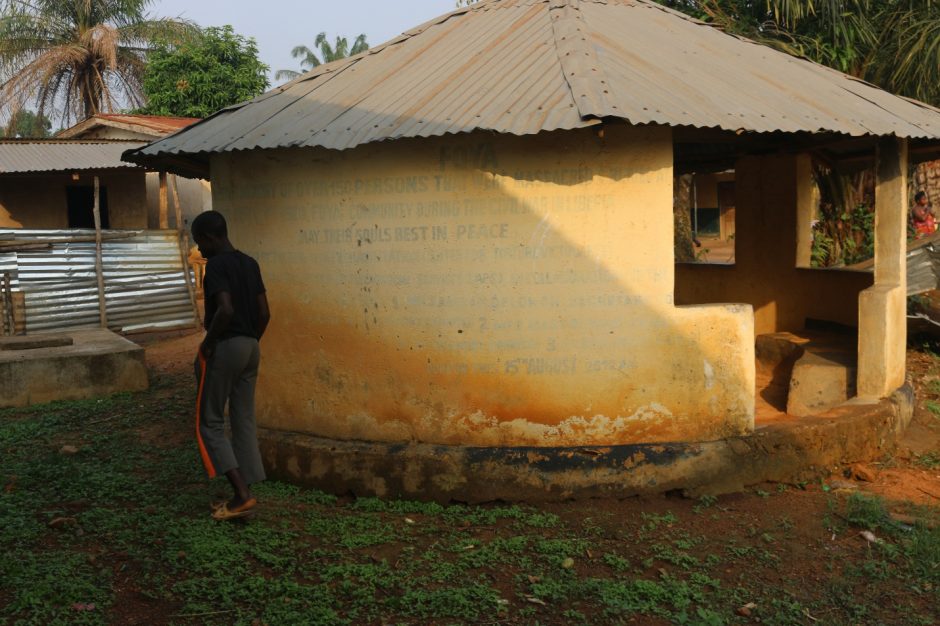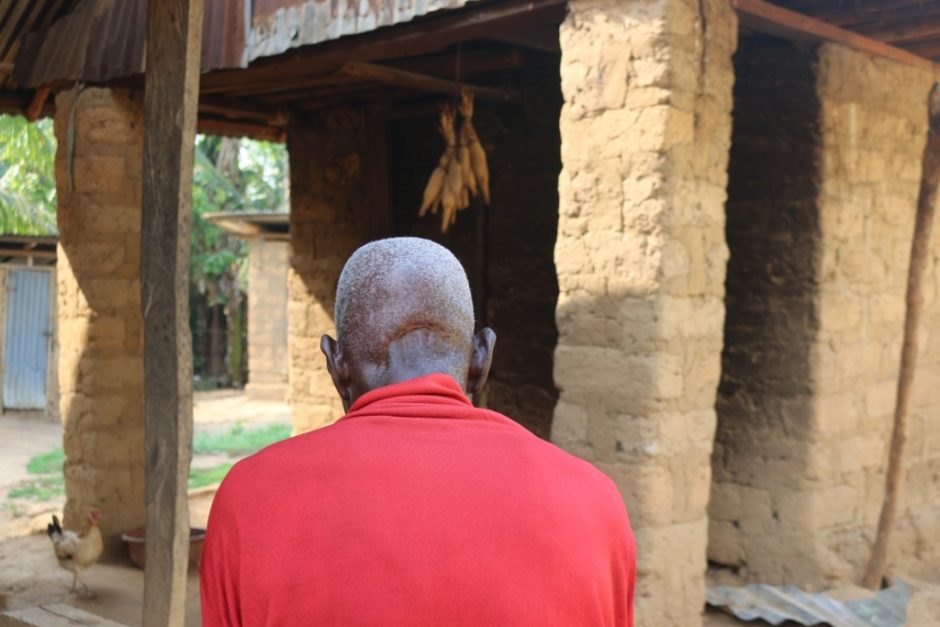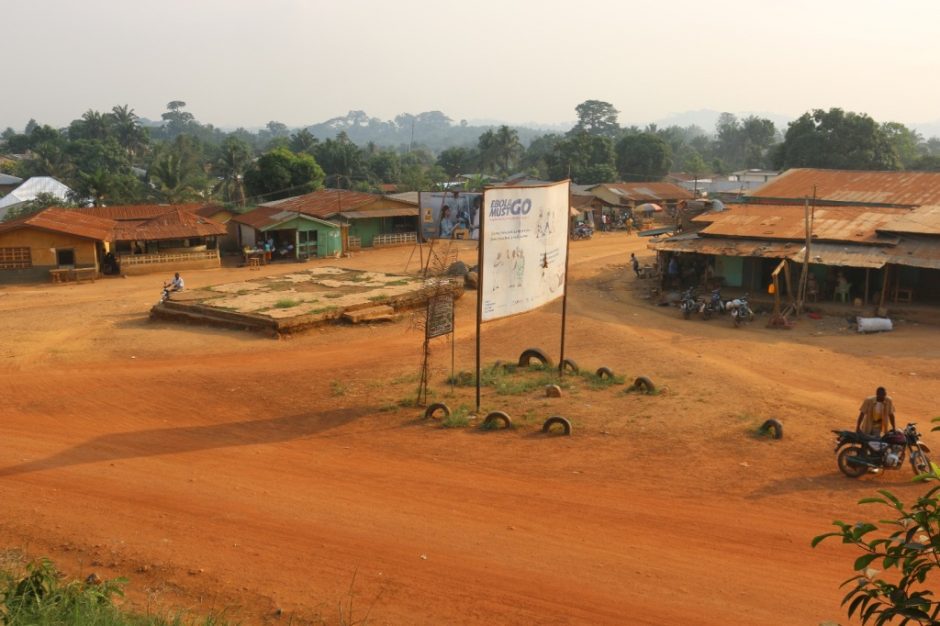
FOYA, Lofa County, Liberia – Mary Ndominin, now in her 50s, will never forget that day in September 1994 when a ULIMO commander aliased “Ugly Boy” killed her husband and ate his corpse. Rebels of the United Liberation Movement of Liberia for Democracy seized Saah Ndominin, tied him up by passing a wire through a hole they drilled through the veins at the back of his thighs, took him at the center of Foya City and killed him.
“They cut here and put it in the pan,” she says, holding the flesh on her arms.
“They cut here and put it in the pan,” she says squeezing the flesh on her legs. “Ugly Boy opened his chest and took out his heart, then they cooked it and ate it.”
Survivors like Mrs. Ndominin in this Kissi region of Lofa County bordering Guinea and Sierra Leone have horrible memories of ULIMO and their time here. The group overran rival rebels of the National Patriotic Front of Liberia (NPFL) from here on June 24, 1993, survivors say, and ravaged the area until 1996. The group—made up predominantly of Mandingoes—killed, raped, enslaved and, among other crimes, looted Foya.
A number of ULIMO rebels were recommended by the Truth and Reconciliation Commission of Liberia to face a war crimes court, but that has yet to happen 10 years after the TRC report. However, the prosecutions of ex-ULIMO commanders in the United States and Europe in connection with their roles in the Liberian Civil War (1989–2003) have inspired hope among the local population for justice.

So far, two ex-ULIMO commanders are being prosecuted in Europe for war crimes and crimes against humanity: Alieu Kosiah in Switzerland and Kunti K. in France. Kosiah was indicted last month after Swiss-based Civitas Maxima filed a complaint for seven Liberians who alerted Swiss authorities of his alleged crimes, according to Trial International. Kunti K. was indicted September last year following a complaint by the Swiss-based group for Liberian victims.
Another, Mohammed Jabbateh, alias “Jungle Jabbah” is serving a 30-year sentence in the United States after a Philadelphia court last year convicted him for committing immigration offenses by lying on his role in the Liberian Civil War. Civitas Maxima also helped prosecute Jabbateh in collaboration with Monrovia-based Global Justice and Research Project (GJRP).
Back here on this rainy evening in Foya, Mrs. Ndominin says she will be willing to testify against the ex-ULIMO rebels who she says killed her husband if there is a war crimes court for Liberia.
“They did bad to my husband,” she says as large raindrops hit the roof a new house she’s building. “We were supposed to take good care of our children,” she laments, adding that before her husband’s death she had lost two children in the forest where they hid from ULIMO when they captured Foya.
Sources say witnesses testifying in these cases come from Foya, but Hassan Bility of GJRP says he could not comment on cases that are ongoing.
In order for Mrs. Ndominin and other survivors in Foya to testify at a Liberian war crimes court, the court has to first be created. So far, President George Weah has not shown political will to set up the court. But the hope of Mrs. Ndominin and others is alive as the debate of the court has resurged since Weah became president last year. The United Nations Human Rights Committee has given Liberia up to June next year to address crimes committed during its civil war.
“Let the court come now, now,” says 89-year-old Nyuma Kolondo of a village called Yandema in the Foya Tengia clan through an interpreter. “They must come with the court for those bad, bad people.”
Kolondo says he survived ULIMO’s onslaught on his village. He says one ULIMO rebel he only remembers as “Operations” chopped the back of his head with a cutlass on his farm in June 1993. Operations and other rebels, he says, accused him of supporting NPFL rebels. They thought he was dead, ate up his sugarcane until they tired and took all of his belongings. Later, his family found him and took him to a doctor who stitched his wounds without any anesthetic.
“If it’s the person who [tried to kill me] they caught, I can testify [against him],” says Kolondo, who says due to the injury he sustained that day he is blind in one eye and has a nerve problem.
“Of course, justice must prevail,” says Thomas Korpu, 43, another survivor, who says he witnessed Mr. Ndominin’s death and other crimes. He says that ULIMO rebels on one occasion made him carry their load from Foya to Surlumba, a five-hour walk to the Guinea border.

Korpu says at one point he had to run into hiding, because Ugly Boy began hunting light-skinned men. Ugly Boy wanted to be the only light-skinned, handsome man in Foya, according to him. People gave him a nickname: Saah Cway for “the firstborn who comes with an axe” in Kissi.
“People must understand it is not good [to commit crimes],” Korpu says.
ULIMO committed more crimes in Foya than any other warring faction, according to survivors. The TRC report did not say much of ULIMO’s alleged Foya killings, except once that “large number of people from the Kissi ethnic group” was killed in October 1993. The report said the group committed seven percent of all the human right violations the TRC heard were committed during the war.
Talking to people in this town it’s clear anyone anywhere in Foya might be a ULIMO victim. Alphonso Bemah, a man walking on the street, says ULIMO rebels cut off his father’s ears and made him eat them. Prince Jacob, 56-year-old sitting at a shop, says Ugly Boy killed his brother and uncle, because they were unable to carry the load he ordered them to. Mary Nyuma, a petty trader in her 40s, says they killed three of her siblings and she lost her daughter to a stray bullet when ULIMO attacked Foya. Another woman, Hawa Nathaniel, in her 50s, says ULIMO rebels killed her husband in September 1993 by pouring a drum of boiled water on him and peeling off his skin as it popped up from head to toe before shooting him dead. Paramount Chief Momo Taylor says the ULIMO commanders used the furniture and doorframes in his house for firewood like they did with many houses in Foya. And Kparlloe Sandikie, a 56-year-old resident scrolling, says ULIMO looted facilities such as large generators that powered the city before the war and a palm oil mill owned by the Liberia Produce Marketing Corporation (LPMC).
‘Meat for sale’
Of all the atrocities survivors say ULIMO allegedly committed in Foya, the killing of 15 boys and men on Monday, June 28, 1993 is the best known. They called it “Black Monday”.
According to Thomas Korngor, 45, a survivor of the massacre who has never left Foya since 1993, ULIMO commanders, including Ugly Boy, one identified only as Daykue and another only as Major Fofana, ordered everyone to go to the police station. The rebels separated men from women and children. They deployed men armed with machine guns on the Tamba Taikor Hill overlooking Foya City. They selected the 15 people from the crowd, placed them in the police cell and killed them the next morning, hacking some and shooting some at pointblank range. He says the rebels had held several “meetings” before and killed people, but they decided to kill everyone at the meeting on Black Monday.
Korngor says he and the rest of crowd were only saved after a rainstorm, but the rebels wouldn’t allow them go home until they sang for them a Kissi song that translates to, “This is the time the bananas have gotten ripe.” He still remembers three of the people killed that day: Thomas Borbor, Nyumah Salia and Saah Sondo.
“I will like…the war crimes court to be here in Liberia so that most of those guys that did something to us can face trial,” he says, sitting in a rattan chair in his Ndoliloe village. “What they did to us, if they can go [scot-free] like that I will not feel pleased. It will be important for me to face the judge and tell him the things that I know.”
A week or so after Black Monday ULIMO killed another nine men—five civilians and four NPFL rebels they had captured months earlier—according to Tamba Saah (not his real name of fear of reprisal). Their killing was retaliation to the killing of a brother of one of the ULIMO commanders who went by the alias “Mammie Water”, according Saah.
The rebels butchered the nine men, put their body parts in a wheelbarrow and labeled it “Meat for sale”. “Everyone they passed by had to pay for the ‘meat’,” he says. “You would not pass by that ‘meat’ without paying a cent.”
Saah says some of the ULIMO commanders are living in Monrovia, but Ugly Boy—whose real name he says was Talata Sheriff—was killed by a mob 1997 in Macenta, Guinea after he allegedly killed a driver and took his vehicle.
“They put tires around his neck and burned him to death,” Saah says. “They say ‘You live by the sword, you die by the sword.’”
This story first appeared on FrontPageAfricaOnline as part of a collaboration for the West Africa Justice Reporting Project.
